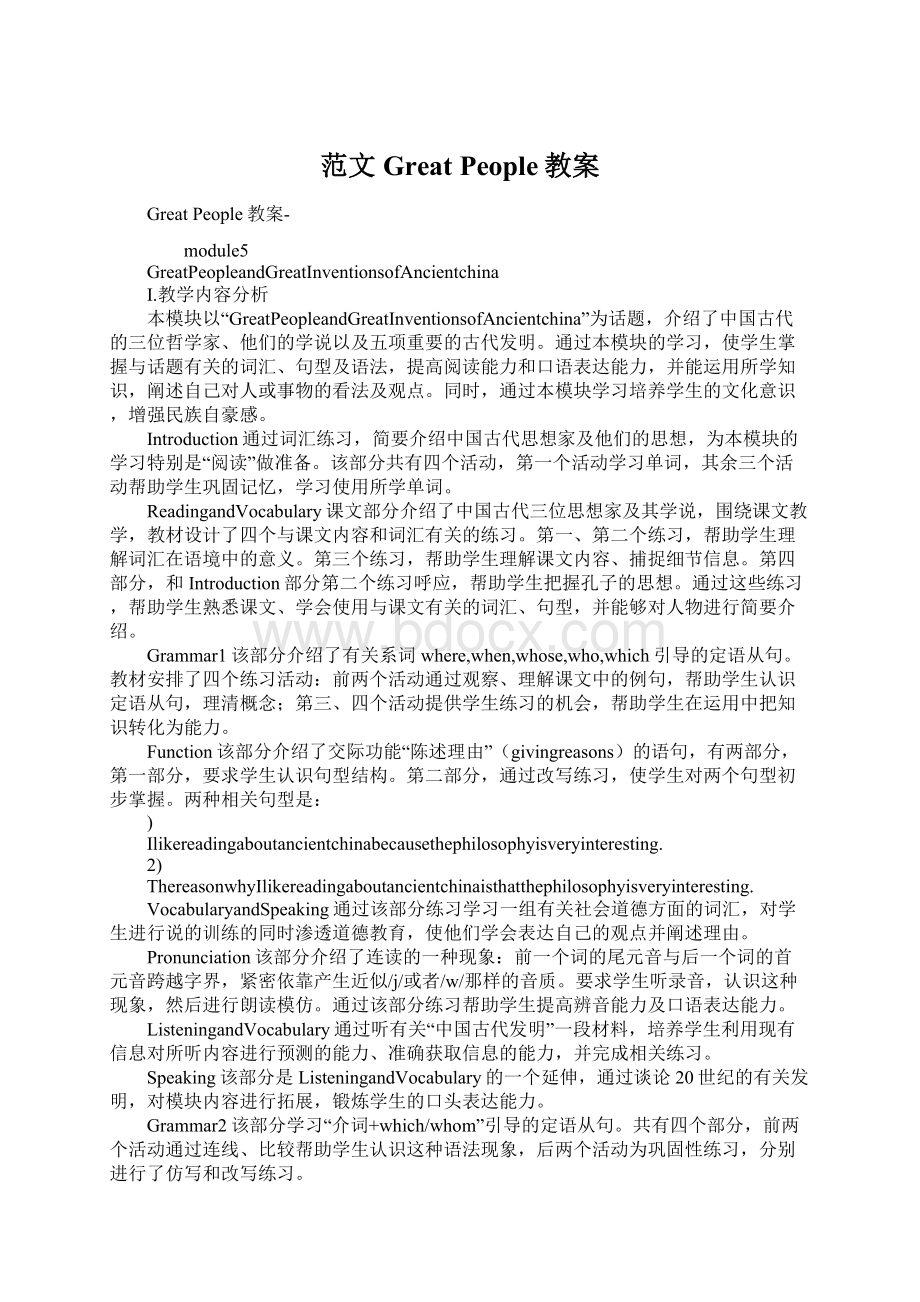范文Great People教案.docx
《范文Great People教案.docx》由会员分享,可在线阅读,更多相关《范文Great People教案.docx(13页珍藏版)》请在冰豆网上搜索。

范文GreatPeople教案
GreatPeople教案-
module5
GreatPeopleandGreatInventionsofAncientchina
I.教学内容分析
本模块以“GreatPeopleandGreatInventionsofAncientchina”为话题,介绍了中国古代的三位哲学家、他们的学说以及五项重要的古代发明。
通过本模块的学习,使学生掌握与话题有关的词汇、句型及语法,提高阅读能力和口语表达能力,并能运用所学知识,阐述自己对人或事物的看法及观点。
同时,通过本模块学习培养学生的文化意识,增强民族自豪感。
Introduction通过词汇练习,简要介绍中国古代思想家及他们的思想,为本模块的学习特别是“阅读”做准备。
该部分共有四个活动,第一个活动学习单词,其余三个活动帮助学生巩固记忆,学习使用所学单词。
ReadingandVocabulary课文部分介绍了中国古代三位思想家及其学说,围绕课文教学,教材设计了四个与课文内容和词汇有关的练习。
第一、第二个练习,帮助学生理解词汇在语境中的意义。
第三个练习,帮助学生理解课文内容、捕捉细节信息。
第四部分,和Introduction部分第二个练习呼应,帮助学生把握孔子的思想。
通过这些练习,帮助学生熟悉课文、学会使用与课文有关的词汇、句型,并能够对人物进行简要介绍。
Grammar1该部分介绍了有关系词where,when,whose,who,which引导的定语从句。
教材安排了四个练习活动:
前两个活动通过观察、理解课文中的例句,帮助学生认识定语从句,理清概念;第三、四个活动提供学生练习的机会,帮助学生在运用中把知识转化为能力。
Function该部分介绍了交际功能“陈述理由”(givingreasons)的语句,有两部分,第一部分,要求学生认识句型结构。
第二部分,通过改写练习,使学生对两个句型初步掌握。
两种相关句型是:
)
Ilikereadingaboutancientchinabecausethephilosophyisveryinteresting.
2)
ThereasonwhyIlikereadingaboutancientchinaisthatthephilosophyisveryinteresting.
VocabularyandSpeaking通过该部分练习学习一组有关社会道德方面的词汇,对学生进行说的训练的同时渗透道德教育,使他们学会表达自己的观点并阐述理由。
Pronunciation该部分介绍了连读的一种现象:
前一个词的尾元音与后一个词的首元音跨越字界,紧密依靠产生近似/j/或者/w/那样的音质。
要求学生听录音,认识这种现象,然后进行朗读模仿。
通过该部分练习帮助学生提高辨音能力及口语表达能力。
ListeningandVocabulary通过听有关“中国古代发明”一段材料,培养学生利用现有信息对所听内容进行预测的能力、准确获取信息的能力,并完成相关练习。
Speaking该部分是ListeningandVocabulary的一个延伸,通过谈论20世纪的有关发明,对模块内容进行拓展,锻炼学生的口头表达能力。
Grammar2该部分学习“介词+which/whom”引导的定语从句。
共有四个部分,前两个活动通过连线、比较帮助学生认识这种语法现象,后两个活动为巩固性练习,分别进行了仿写和改写练习。
writing通过完成相关练习,帮助学生初步认识英语中论文的结构及常用词语,学习写作论文,阐述自己对人对物的看法。
EverydayEnglish通过补全对话的形式,使学生理解并掌握所列出的五个日常用语。
culturalcorner该部分介绍了欧洲工业革命的历史背景及其影响,帮助学生扩大知识面。
Task该部分是对本模块的复习和应用,让学生写一篇介绍中国古代名人的,介绍其生平事迹及思想。
moduleFile帮助学生对本模块的知识进行复习归纳,对自己的学习进行总结和检验。
II.教学重点和难点
.教学重点
掌握有关中国古代思想家及中国古代发明的词汇;
学习定语从句;
学习陈述理由的语句;
初步掌握论文的写法。
2.教学难点
定语从句,特别是“介词+关系词”结构;
学会对将要听到的材料内容进行预测、认识连读现象并进行模仿;
学习写作论文。
III.教学计划
本模块分六个课时:
第一课时:
Vocabulary,Introduction,Vocabularyandspeaking
第二、三课时:
ReadingandVocabulary,Task
第四课时:
Grammar1&2,Function
第五课时:
ListeningandVocabulary,EverydayEnglish,culturalcorner,Speaking
第六课时:
Pronunciation,writing,moduleFiles
IV.教学步骤
Period1Introduction,Vocabularyandspeaking
TeachingGoals:
.
TogetSstolearnsomewordsaboutphilosophersandtheirideas.
2.
TogetSstoknowsomethingaboutthethreephilosophersofAncientchina.
3.
Tolearnsomeexpressionsonsocialmorals.
TeachingProcedures:
Step1.Introduction
.Leading-in
AskSstoanswerthefollowingquestionstoleadthemtosaysthaboutchinesephilosophersandinventions.
Therearemanygreatphilosophersinancientchina.canyousaysome?
canyousaysomethingabouttheideasofconfucius,menciusandmozi?
whatarethefourgreatinventionsofchina?
canyousaytheinfluenceofthechinesefourgreatinventions?
2.Vocabularystudy
AskSstoreadthevocabularyofmodule5onpage115individually.
Askastudenttoreadthewordstotheclass.Giveoutcorrectionsifthereareanymistakes.
AskSstopracticereadingthewords,andthenaskthemtoreadtogether;makesuretheycanreadthemcorrectly.
3.Practice
AskSstoreadthewordsinActivity1onpage41andmakesurethattheyknowtheirmeanings.
AskSstofillintheblanksinActivity1byusingsomeofthewordsinthebox.Thencallbacktheanswers.
AskSstogooverthestatementsinActivity2andticktheideasthatconfuciustaught.
4.Speaking
AskSstodiscussthefollowingquestionsingroups:
whatdoyouknowaboutconfucius,menciusandmozi?
whatideasdoyouagreewithmost?
Andwhy?
AsksomeofthemtoexpresstheiropinionsfollowingtheexampleinActivity3onpage41.
Step2.Vocabularyandspeaking
.AskSstopayattentiontothefollowingwordformationsandthendiscussthem.
equal—equality,
important—importance,honest—honesty,
fluent—influential
contribute—contribution,invent—invention—inventor
argue—argument
free—freedom
wise—wisdom
2.AskSstoreadthewordsinActivity1onpage45aloud.Thenaskthemtodothefollowingexercisetohelpthemunderstandbetter.
--who’s__________today?
--Iam.AndIhavejustcleanedtheblackboard.
Theteachersoftenaskustohaveasenseof________.Thatis,weshouldtryourbesttodoourworkwell.
Tomnevertellslies,andhis________gainsthe________ofothers.
_________isthebasicprincipleoflaw.
Hebelievedin________and______,sohewasalwayshelpingothers.
SuggestedAnswers:
Dutyresponsibilityhonesty,respectjusticekindness,love
3.AskSstoworkingroupsanddiscusstheideasintheboxinVocabularyandSpeakinginorderofimportanceinsocietyandexplaintheirreasons.AsksomeSstoexpresstheiropinions.
Step3.Homework
.AskSstoreviseandrememberthevocabularyinthismodule.
2.AskSstofinishActivities4,5and6inVocabularyonpage92.
3.AskSstopreviewReadingandVocabularyinthismodule.
4.AskSstothinkoutafamouspersonfromancientchinaandsearchformuchinformationabouthim.
Period2~3ReadingandVocabulary,Task
TeachingGoals:
.
ToenableSstomastersomewordsandexpressions.
2.
ToimproveSs’readingskills.
3.
TohelpSsknowsomethingaboutthreechinesephilosophersandtheirideas.
TeachingProcedures:
Step1.Revision
.checktheanswerstoActivities4,5and6inVocabularyonpage92.
2.AskSstofillinthefollowingblanks.
confuciusisoneofthegreatp
inancientchina.
Theybelievedthatallhumanbeingsarecreatede
.
chinahasmadegreatc
toscience.
“H
isanimportantquality.”theteachersaid.
Ar
issomeonewhocontrolsacountry.
Asweallknow,Edisonisagreati
.
moreandmorepeoplehaverealizedthei
ofEnglish,sotheybegintoattendallkindsoflanguageschools.
Someofmozi’s
weredifferentfromthoseofconfucius
SuggestedAnswers:
philosophersequalcontributionsHonesty
ruler
inventorimportanceteachings
Step2.Leading-in
.AskSstolookatthepicturesonpage43andtalkaboutthembyfollowingthequestions:
Saythreethingsyouknowaboutconfucius.
Saywhatyouknowaboutmenciusandmozi.
confucius
mencius
mozi
Step3.Reading
.Fastreading
AskSstoreadthetextquicklyandanswerthequestion:
whowroteabookhimself,confucius,mencius,ormozi?
SuggestedAnswers:
mencius
2.Intensivereading
AskSstoreadthetextcarefullyandchoosethecorrectanswerstoActivity3onpage42.
AskSstofillinthefollowingform.
philosophers
sthabouttheirlife
theirideas
influence
confucius
551Bc---479Bc,atimewhen…
mencius
mozi
SuggestedAnswers:
philosophers
sthabouttheirlife
theirideas
influence
confucius
551Bc---479Bc,atimewhen…
stressedtheimportance…
thegreatest,formorethanXXyears
mencius
372Bc---289Bc,…died,wasbroughtup…,astudentof…,wasgiven…,resigned…,traveled…,became…
Thebooksofmencius
verysimilarto…,manisgood,believedpeopleweremoreimportant,hated…
great,butlessthanconfucius
mozi
476Bc---390Bc,poor,famousfor,
mohism,similarto…insomeway,government…important,allmen…equal,hisideaoflove…,hated…
great,butlessthanconfucius
AskSstoretellthetextaccordingtotheinformationintheform.
Foryourreference:
confuciuswasbornin551Bcanddiedin479Bc.Itwasatimewhenstateswereoftenatwarandalsoatimewhenthereweremanygreatphilosophers.Hestressedtheimportanceofkindness,dutyandorderinsociety.Hisinfluence,whichlastedformorethatXXyears,wasthegreatestofthethree.
Step4.LanguagePoints
AskSstodiscusstheimportantanddifficultlanguagepoints.
.Ancientchinawasaplacewherestateswereatwarwitheachother.中国古代各诸侯国经常交战。
where引导定语从句,修饰aplace。
(让学生找出中其他的定语从句。
)
beatwar在交战。
如:
In1920PolandandRussiawerestillatwar.
※【拓展】
“at+不带冠词的名词”表示“从事某工作”或“出于某种状态”。
如:
①Heisatwork.=Heisworking.
②Thefamilyareatbreakfast.=Thefamilyarehavingbreakfast.
2.menciuswasathinkerwhoseteachingswereverysimilartothoseofconfucius.孟子的学说和孔子的学说非常相似。
besimilarto和……相似,其反义词组为“bedifferentfrom”。
如:
ourschoolissimilartoyours.
※【拓展】
besimilarinsth在……方面相似。
如:
Goldissimilarincolortobrass.
句中的those代替theteachings,避免重复。
that用来代替单数名词。
如:
①HismethodofteachingisnothinglikethatoftheteachersatmyjuniorHighSchool.
②TheclimatehereisnothinglikethatinLanzhou.
3....andwasthengivenanimportantpositioninthegovernmentofastate.在一个诸侯国担任重要职位。
position地位,职位。
如:
you’dbetterasksomeoneinapositionofauthority.你最好咨询一下权威人士。
※【拓展】与position有关的词组:
abuseyourposition滥用职权
holdaposition
担任一个职务
bein/outofposition在/不在适当的位置
4.However,whenhesawthattherulerwasnotfollowinghisadvice,heresigned.然而当他看到统治者并不接受他的意见时,他辞职了。
Follow的用法:
followone’sadvice/orders/wishes听从某人的忠告/服从某人的命令/遵照某人的愿望
followone’sinstructions/directions按照使用说明/指示去做
Payattentiontothefollowingsentences:
注意下面的句子。
Ididn’tquitefollowwhatshesaid.我不大明白她说的话。
Theresultsareasfollows:
Firstwasclass1;second,class2;third,class3.结果如下:
第一名一班;第二名,二班;第三名,三班。
5.Formanyyearshetraveledfromstatetostate,teachingtheprinciplesofconfucius.许多年来,他周游列国,传授孔子的思想。
from…to…从……到……
fromdoortodoor/fromhousetohouse
fromhandtohand(从一手到另一手)fromheadtofoot(从头到脚)
teachingtheprincipleofconfucius
是-ing形式作状语。
如:
①Fillintheblanksusingthewordsinthebox.
②Hewasseatedtherereadinganovel.
6.HespenthislastyearspreparingabookofhisteachingscalledTheBookofmencius.他在晚年整理了自己的学说汇编成一本书《孟子》
one’slastyears某人的晚年
spendsthonsth/doingsth花费时间;度过。
如:
①Howlongdidyouspendonyourhomework?
②maryspenttoomuchtimewatchingTV.
③mostofherlifewasspentincaringforothers.
Step5.Task
.AskSstodiscussinpairstogettheideahowtowriteaboutafamouspersonfromancientchinabyansweringthefollowingquestions:
Q1.whowashe?
Q2.whenandwherewasheborn?
Andwhenandwherewashedied?
Q3.whatkindofdifficultiesdidhehave?
Q4.whatwashefamousfor?
Q5.whatabouthisinfluence?
2.AskSstofindouttheusefulexpressionsinthetextPhilosophersofAncientchina.
3.AskSstowriteafamouspersonfromancientchina.
Foryourreference:
XunZi,oneofthegreatestphilosopherswholivedbeforeQindynasty,wasagreatthinkerwhokepttothestandoftheconfucianism.Hisviewwasthathumannaturewasevilatthebeginningandthatexternalfactorssuchasconfucianethicsandmoralstandardwereparticularlyemphasizedonhumanbehaviors.Hesuggestedthatpeopleshouldtreattheworldwithimpersonalityandintellect.Andhisthoughtwascarriedforwardinlargescaleinchineselonghistory.